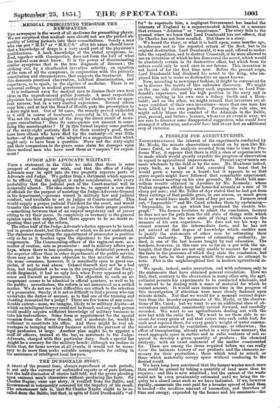THE' DTINDONALD STORY.
A. TRAIT of the preeent time' always reprodneed at such periods, is not only, the currency of unfounded reports or of pure fictions, but thehalf-discussion of stories half-told, and the grave pleading upon eminentmen's charae*rs Without prodnping the facts. Sir Charles Napier;-tuns one 5tbife,ire8aleillitan the Baltic,- and Government fairvehemeOtjfedilinie0detlii8111616plicy of his recall. The ocianterpartt talethat Sir ChaileittNAPer ought to be re- called from 1334dtic-, bittlitiat, in stitti of Laid Ihindoziald's "of. for" to supersede him a negligent Government has handed the interests of England. him, a superannuated Adiniral, in. a ' manner that evinces " delusion " or "connivance." The story falls, to the ground when we learn that Lord Dundonald has not offered, that Sir Charles has not been recalled. But there is a story. We heard the story, or what it is built upon, some months ago, in reference not to the reported return of the fleet, but to its original destination. Lord Dundonald, it was said, offered to under- take the expedition, and to destroy Cronstadt, if he were allowed to use an invention of which he has discovered the secret, which would be absolutely certain in its destructive effect, but which from its nature could only be used once in our favour. This invention is not heard of for the first time now. Before the present reign, Lord Dundonald had disclosed his secret to the King, who im- plored him not to make so destructive an agent known. Now, according to newspaper fashion, it might be convenient for us to discuss the merits of this unknown discovery. We might on the one side elaborately array such arguments as Lord Dun- donald's experience, and his high position in the navy and in science, uniting in his own case a Sidney Smith and a Hum- boldt; and on the other, we might remark that inventors are al- ways confident of their own inventions—more than one man has been killed by his own parachute. Pursuing the rule also, we might safely blame the conduct of the Admirals in the Baltic, past, present, and future ; because, whenever an event is over, we are sure to discover some disappointed suggesters, who would have arranged it otherwise, and would hare laid at our feet an additional crop of victories.


























 Previous page
Previous page